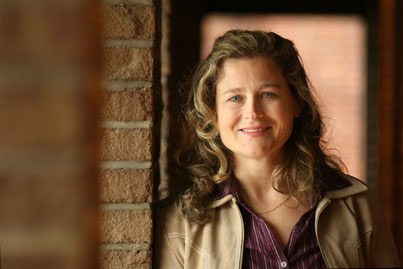Fighting the new F-word

PhD student Liz Meyer is studying why homophobia all too often goes unaddressed in high schools.
When Liz Meyer was fired from her first teaching job in New York State in 1994, it was the first time she had ever experienced discrimination. A white, educated, self-described “army brat,” Meyer lived a life of privilege until the day her employer discovered she was gay.
“I was ambushed one morning,” said Meyer, who was 23 at the time. “When the headmaster found out I had written an article for a gay and lesbian newsletter I got called into his office and asked to leave. It caught me totally off guard.”
The experience crystallized her political identity.
Now a 35-year-old PhD student in Integrated Studies in the Faculty of Education, Meyer spent months interviewing six teachers in one urban Quebec public school board to find out why high schools seem to be the last bastion of un-sanctioned homophobic slurs.
Meyer’s study, “Gendered Harassment in High School: Understanding Teachers’ Non-Interventions,” explores behavior that polices the gender hierarchy, such as macho-masculinity, uber-feminism and heterosexuality and punishes people who don’t meet those standards.
She recently presented her thesis at the American Educational Research Association in Chicago.
“Inadequate policies, lack of support from administrators, colleagues role-modeling sexist and homophobic behaviors all play a part in creating a school culture which tolerates gendered harassment,” said Meyer.
Often, teachers feel they can’t do anything about kids harassing other kids because other teachers behave the same way or because they’ll suffer professionally for intervening.
Recent incidents involving adults have highlighted the sanction gap between the use of racist and homophobic slurs. Political commentator Ann Coulter suffered no punishment for calling democratic presidential hopeful John Edwards a “faggot;” actor Isaiah Washington was sent to rehab for calling a Grey’s Anatomy co-star the same thing. But radio shock jock Don Imus was fired by both CBS and MSNBC for using racially pejorative term to describe the Rutgers University women’s basketball team.
Meyer says it should come as no surprise that the same social norms are mirrored among students.
“Anti-gay language is still widely condoned by society and while racism remains a social problem, anti-homophobic workers need to learn from stands taken by anti-racist workers.” As one of her interview subjects pointed out, “The kids are astute enough to see that when they use the word faggot they won’t get sent to the office and when they use a racial slur, they get sent to the office.”
Meyer pointed out that schools are where students learn how to participate in and contribute to a democratic society and learn Canadian values.
“If these institutions continue to model and condone sexist, homophobic, and transphobic behaviors, then the equality rights and the protections outlined in the Canadian Charter of Rights and Freedoms are meaningless,” said Meyer.
“I believe in the transformative power of education and hold out hope that educators will act against gendered harassment when provided the tools and the support to do so.”

